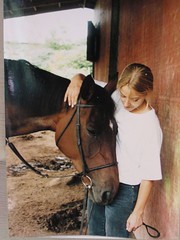Today was my mother's birthday, and three weeks from now will be the 60th anniversary of her death. She died suddenly, from chlorinated hydrocarbon fumes inhaled while cleaning a rug the night before, three weeks after her 38th birthday.
Sixty years. Not just 60 years of time passed, but those 60 years mean that I am eons beyond the 9-year-old who lost her mother. And yet . . .
I read for an hour in bed tonight. The book was Crow Lake, by Mary Lawson, who writes about Canada. She's a good writer. In this book the narrator was 7 years old when her parents were killed in an accident. I read through that part, disturbing and certainly not pleasant but manageable—even when she tells how the little girl didn't believe her parents were really dead, and I remembered the very same disbelief, and the terrible realization in the funeral home that I'd been wrong.
But then the writer spoke of pictures of children who have experienced trauma, and the blankness of their eyes, and I remembered that blankness too—remembered feeling it within—and I put down the book, unable to read anymore.
And that explains why I was downstairs an hour after midnight, cleaning the bathroom and then leaning for a while against the front door, staring out at the rain.
Thursday, October 18, 2012
Saturday, October 06, 2012
I need some accountability.
I need to make a change in my habits, and it would be nice if someone were standing over me with a whip. Well, maybe not a whip, exactly. A feather duster would do it. I need to start meditating again, or at least do a solid 20-30 minutes a day of progressive relaxation. And I need to pay attention to my breathing throughout the day, and scan for areas of muscle tension.
I did all this, with excellent results, 20 years ago. I was plagued with heart palpitations at the time, and had experienced a few panic attacks. A cardiologist put me on a Holter monitor, and I learned I could trigger the irregular heartbeats by eating candy, drinking milk or coffee, or thinking upsetting thoughts. So I gave up sugar, dairy products (except yogurt), and caffeine, and figured out how to shift my thoughts from the scary to the benign. Then I took myself to the Himalayan Institute, where I learned to breathe.
Diaphragmatic breathing ranks right up there with typing when it comes to usefulness. I have said that giving up smoking (when I was 28) and learning to breathe properly (20 years later) were two of the three healthiest things I ever did for myself. The third was giving up all sorts of foods, but that came later.
At the Institute, I had accountability in spades. It was explained to me that my autonomic nervous system was in overdrive, and the simple acts of breathing awareness and progressive relaxations would calm it down and erase my symptoms. By the time I was ready to put into practice all that I learned there, I was fully aware of how valuable and necessary those practices were for my well being. So I did what I was supposed to do, every day, even though no one was around to beat me with a block of tofu stick if I slacked off.
But people are funny. When we start to feel good, we're tempted to stop taking our medicine. And somewhere along the line I stopped taking care of my nervous system. Even when my muscles tightened to the point of almost constant pain, I didn't realize what was going on. And then last month, when the irregular heartbeat I'd kept at bay all these years started up big time, my first thought was, I guess I need to stop eating yogurt.
Yogurt is not my problem. I don't believe my heart is the problem either, but I have an appointment with a cardiologist next week because some of the episodes have felt serious enough to warrant a consultation. At least my doctor thinks so—after another Holter monitor go-around. But in the past few days I've read a lot about the autonomic nervous system, the chronically activated sympathetic nervous system, and the "rest and digest" parasympathetic nervous system, and I'm convinced what I need is a prescription for all the things I used to do for this part of me. It's a prescription I can write myself.
The cardiologist is Indian, so I hope he will understand. Maybe he'll even stand over me with atandoori chicken leg stethoscope and make me accountable.
But people are funny. When we start to feel good, we're tempted to stop taking our medicine. And somewhere along the line I stopped taking care of my nervous system. Even when my muscles tightened to the point of almost constant pain, I didn't realize what was going on. And then last month, when the irregular heartbeat I'd kept at bay all these years started up big time, my first thought was, I guess I need to stop eating yogurt.
Yogurt is not my problem. I don't believe my heart is the problem either, but I have an appointment with a cardiologist next week because some of the episodes have felt serious enough to warrant a consultation. At least my doctor thinks so—after another Holter monitor go-around. But in the past few days I've read a lot about the autonomic nervous system, the chronically activated sympathetic nervous system, and the "rest and digest" parasympathetic nervous system, and I'm convinced what I need is a prescription for all the things I used to do for this part of me. It's a prescription I can write myself.
The cardiologist is Indian, so I hope he will understand. Maybe he'll even stand over me with a
Subscribe to:
Posts (Atom)

